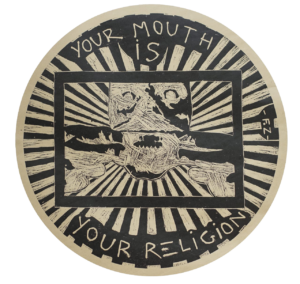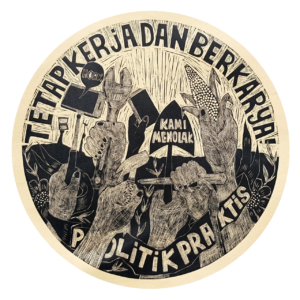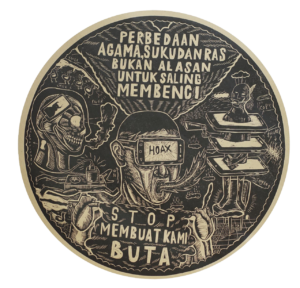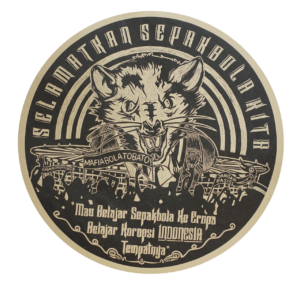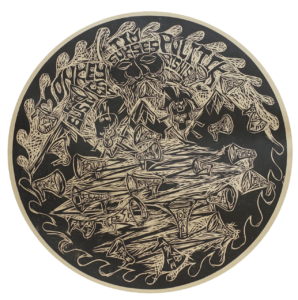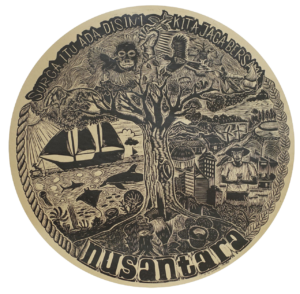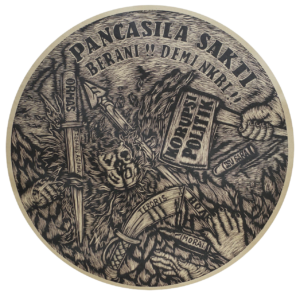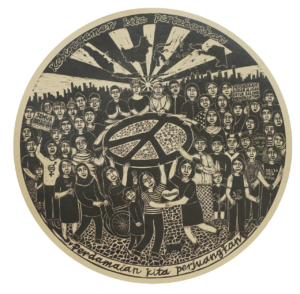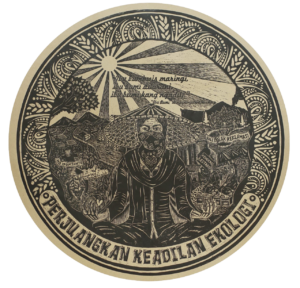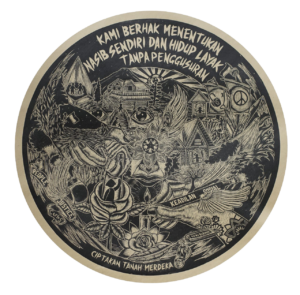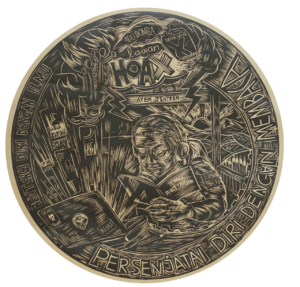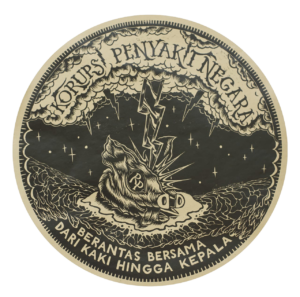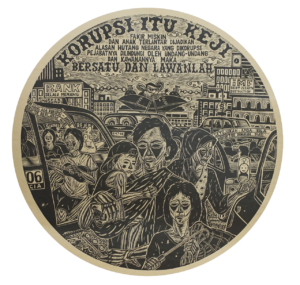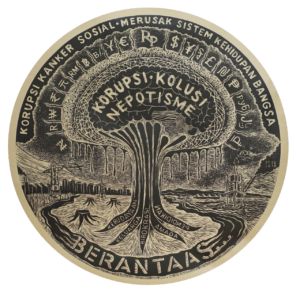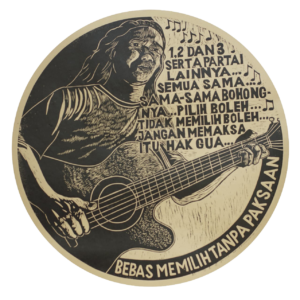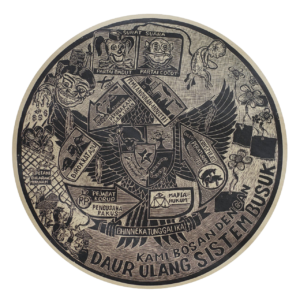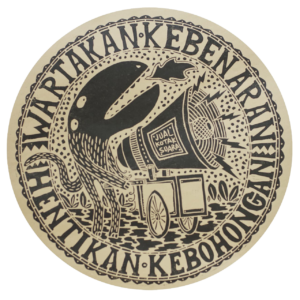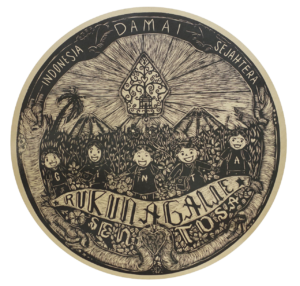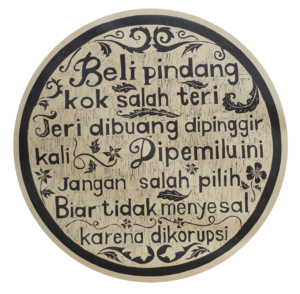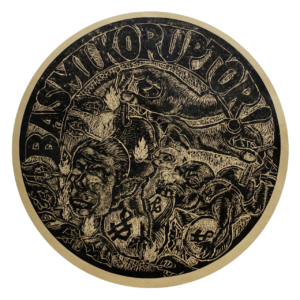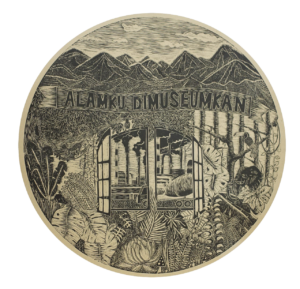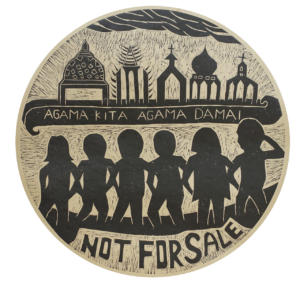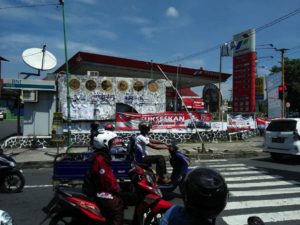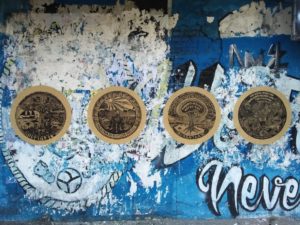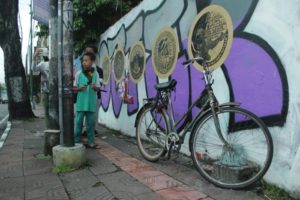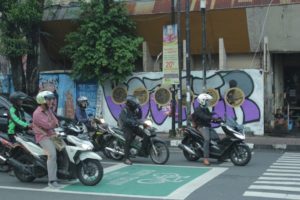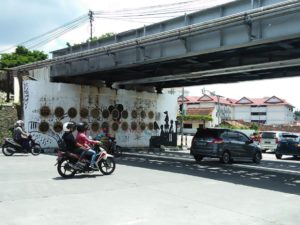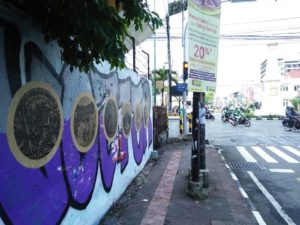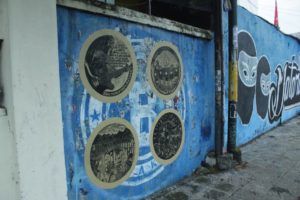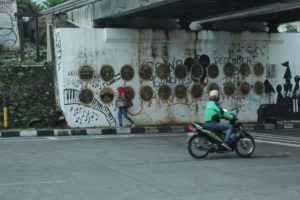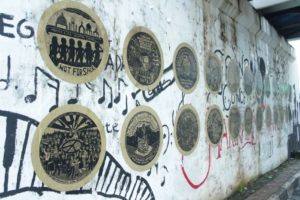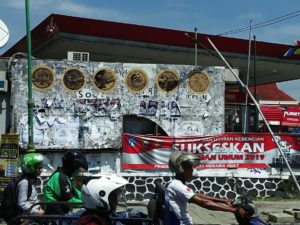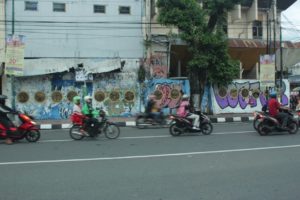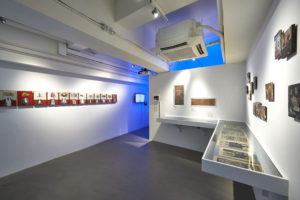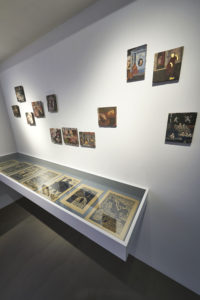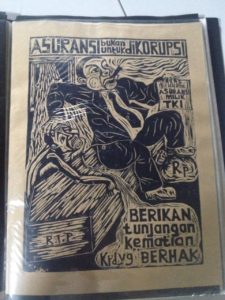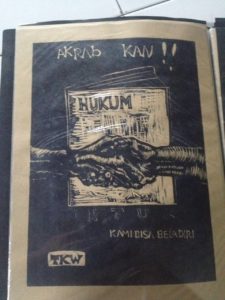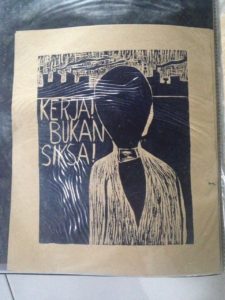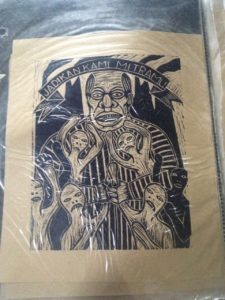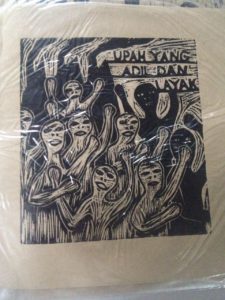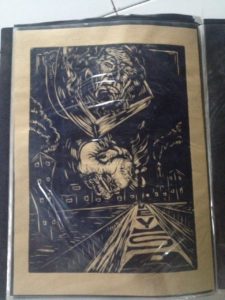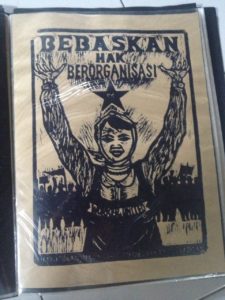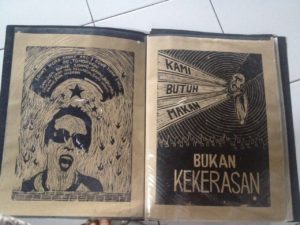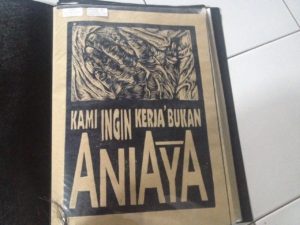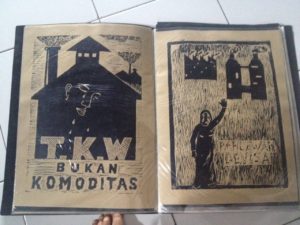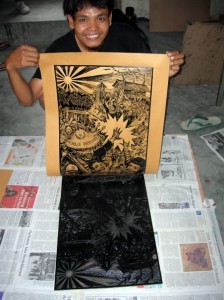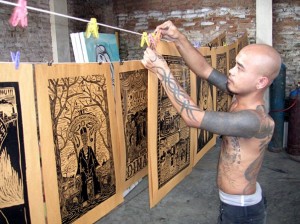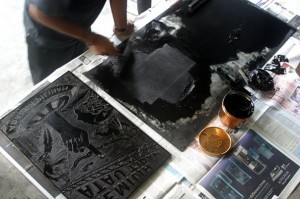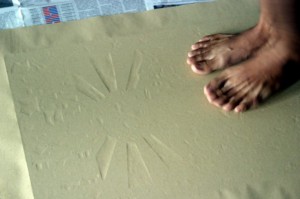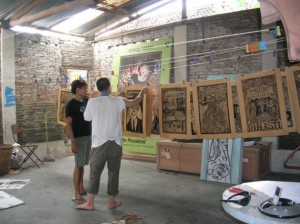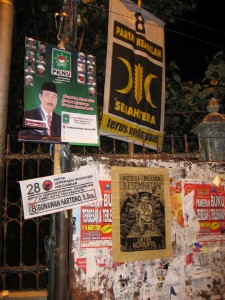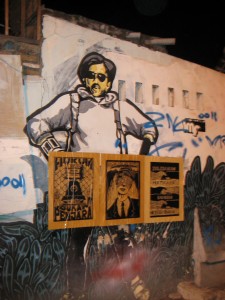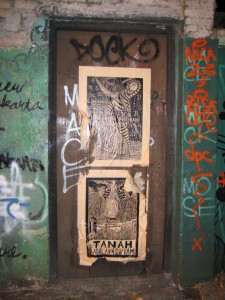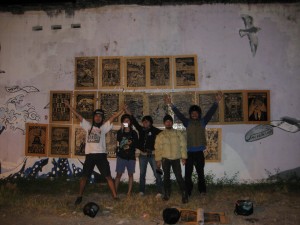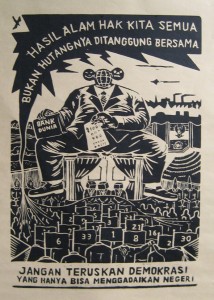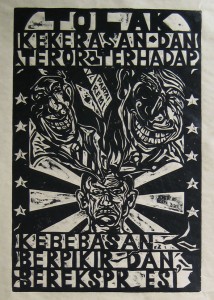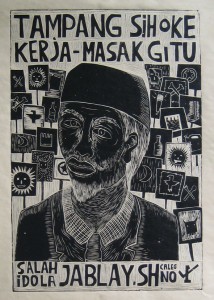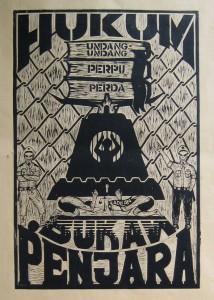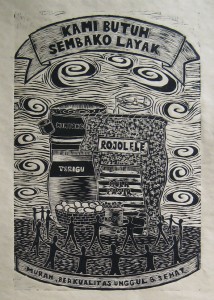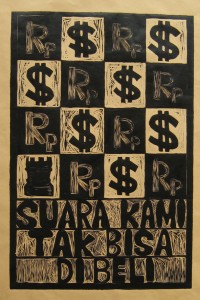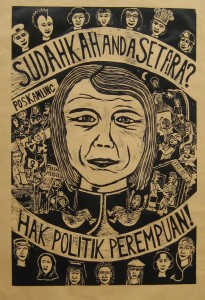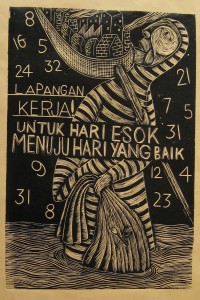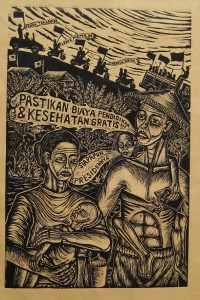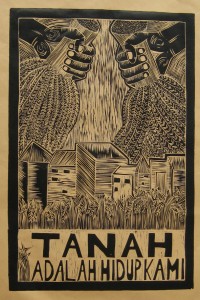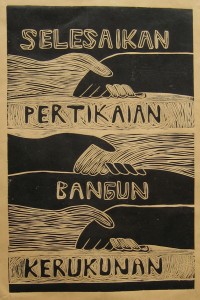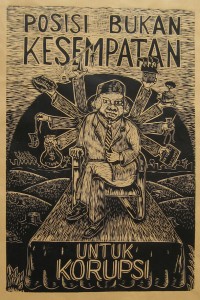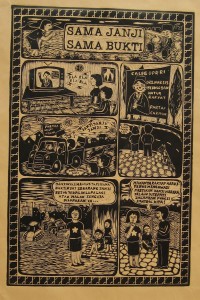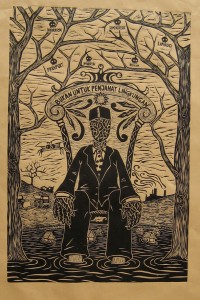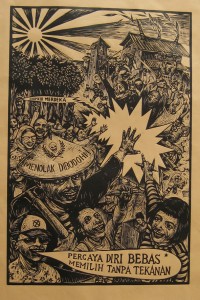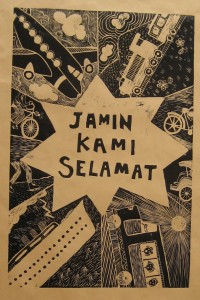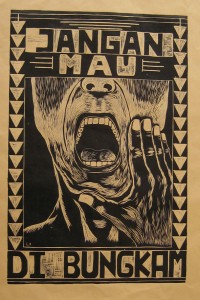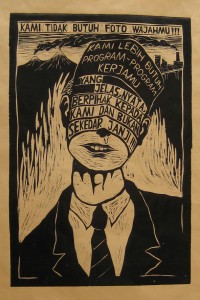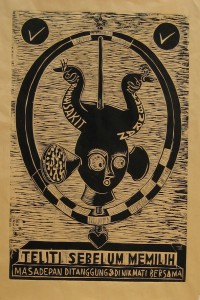As a collective of artists who denounce racism in all its forms, we are shocked and saddened by the media furor that has labelled us as anti-semitic. Through this statement, we want to reaffirm our respect for all human beings, regardless of their ethnicity, race, religion, gender or sexuality. We also seek to offer some context to the history and creation of our dismantled artwork.
The 8 x 12 meter banner “People’s Justice” was produced in Yogyakarta, Indonesia, in 2002, by many members of our collective. The banner was born out of our struggles of living under Suharto’s military dictatorship, where violence, exploitation and censorship were a daily reality. Like all of our artwork, the banner attempts to expose the complex power relationships that are at play behind these injustices and the erasure of public memory surrounding the Indonesian genocide in 1965, where more than 500,000 people were murdered.
During the time of the cold war, after the anti-communist war in Korea and during the one in Vietnam, Suharto’s coup d’état and the subsequent installation of his regime has known vast support from all over the world. Various western democracies, among them our former coloniser, favoured – openly or secretly – a military regime rather than a young democratic republic, that had developed close ties to other socialist and communist countries in the region. The CIA and other secret services allegedly supplied weapons and intelligence.
The imagery of “People’s Justice” presents these internal and external powers in a pictorial scene and tries to capture the complex historical circumstances through a visual language that is at once as disturbing as the reality of the violence itself. “People’s Justice” was painted almost twenty years ago now, and expresses our disappointment, frustration and anger as politicised art students who had also lost many of our friends in the street fighting of the 1998 popular uprising that finally led to the disposal of the dictator.
The imagery that we use is never intended as hatred directed at a particular ethnic or religious group, but as a critique of militarism and state violence. We depicted a possible involvement of the government of the state of Israel in the wrong way. Anti-semitism does not have a place in our hearts and minds.
We deeply regret the extent to which the imagery of our work “People`s Justice” has offended so many people. We apologize to all viewers and the team of documenta fifteen, the public in Germany and especially the Jewish community. We have learned from our mistake, and recognize now that our imagery has taken on a specific meaning in the historic context of Germany. Therefore, we removed the banner from our exhibition, together with documenta fifteen.
We came to documenta fifteen in solidarity with the global struggles that are dismantling colonial legacies that gave rise to state-backed authoritarianism and violence. We welcome documenta fifteen’s courage and ruangrupa’s vision to interrogate this legacy and believe that an open and honest dialogue is the best approach to find solutions and act together. Over the past few days, visitors have come to our exhibition space in Hallenbad Ost to view and engage with our artwork. Many of them have made the time to talk to us and convey both their appreciation and their criticism, and we hope that this will continue.
Latest updates can be viewed on our instagram and facebook pages.
Error validating access token: The user has not authorized application 405460652816219.
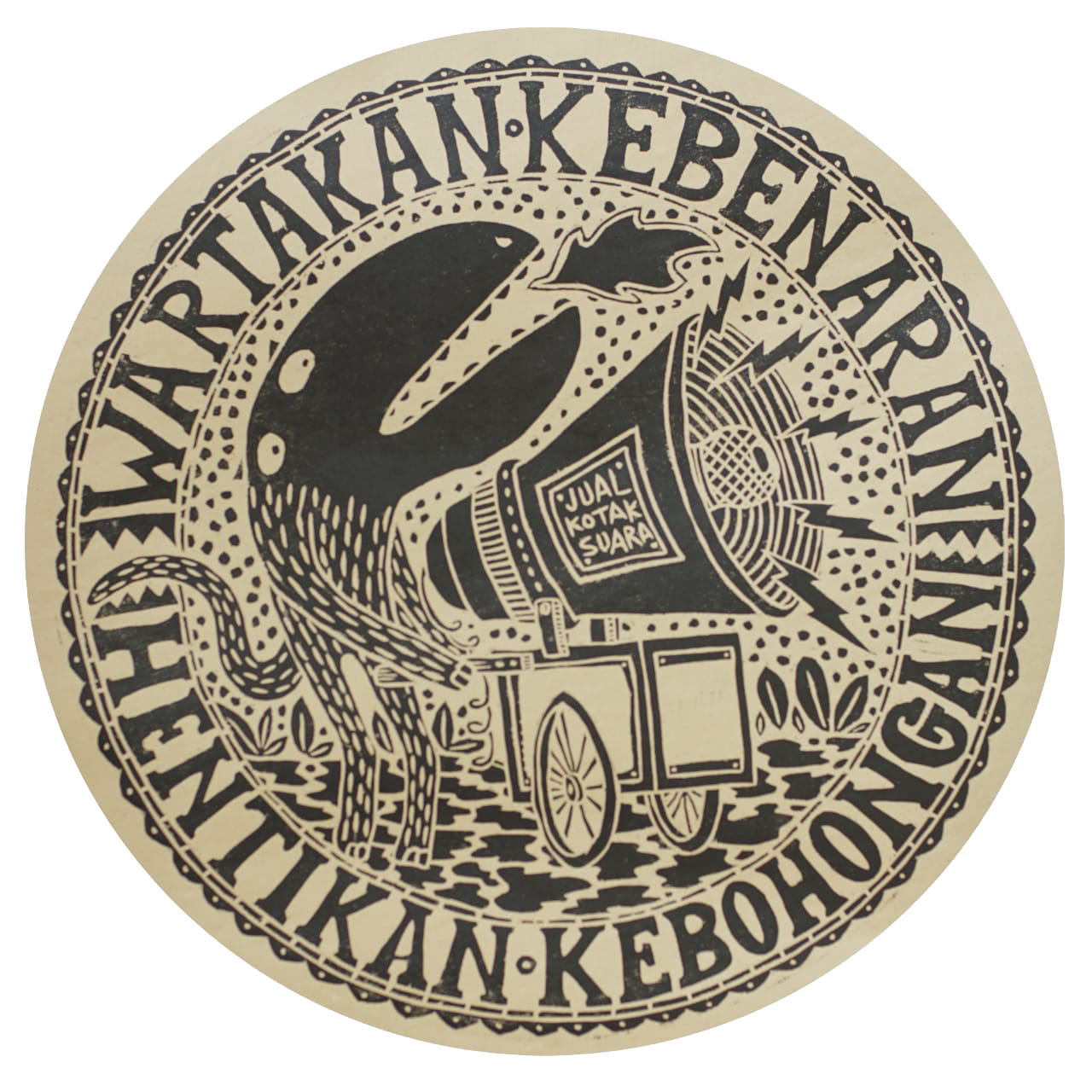
This body of work is the product of a learning process with Taring Padi volunteers, responding to the current social and political situation in Indonesia, especially the 2019 elections. We are conscious that a critical approach is required in order to realise the aspiration of a just and prosperous society. Political education for all, and the demands of the ordinary people are the major themes of this work, although we went on to break this down into issues of corruption, tolerance, the environment and human rights.
The People’s Trumpet 2018 works are woodblock prints on circular format paper with a 58cm diameter. The 22 works in the series have all been crafted by hand in a cooperative between the artists.
The process of dissemination of the People’s Trumpet involved not only exhibiting them in galleries around Indonesia and the world, but also as paste-ups on walls in Jogja, Blora, and Malang. We plan to print these works as a book or zine in order that they can be more widely distributed. We also plan to document the works in film in the near future.
Taring Padi’s artworks are a contribution towards igniting inspiration for people to work for the well being of humanity and to safeguard the environment.
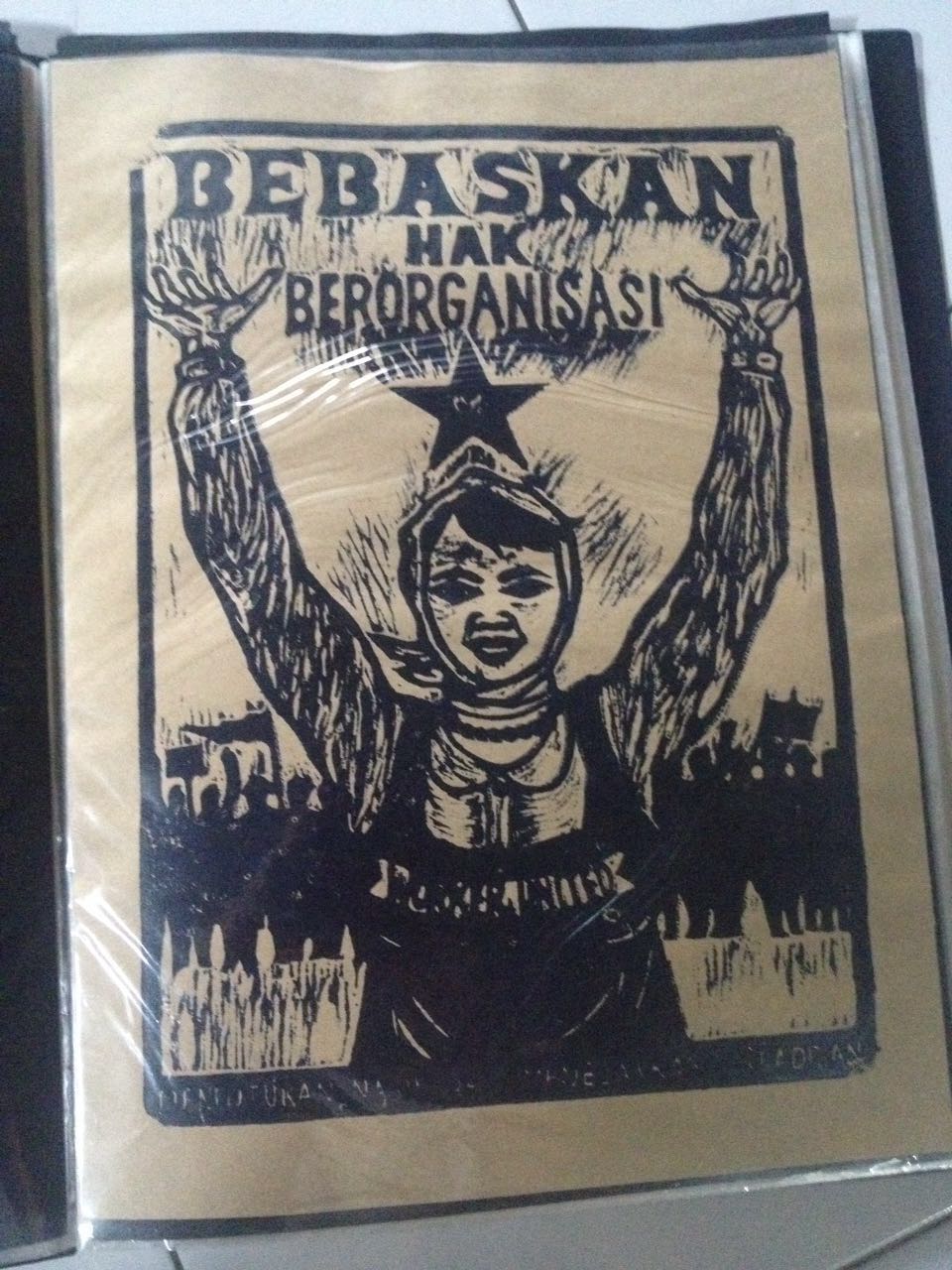
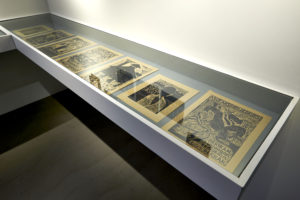
Taring Padi work on display in Afterwork exhibition
Afterwork is a major group exhibition held from March 19 – May 29, 2016 exploring issues of class, race, labor, and migration in Hong Kong, its surrounding region, and beyond. It is part of gallery Para Site’s ongoing Hong Kong’s Migrant Domestic Workers Project, a long-term initiative aimed at engaging the domestic worker community through collaboratively organised public programmes and commissioned artist research. As an exhibition, Afterwork is nevertheless an autonomous proposition, including the often ambivalent and polychromatic aspects of the social and cultural mosaic of Hong Kong, Philippines, Indonesia, as well as of other contexts.
Afterwork includes works by Taring Padi from the 2004 Buruh (Workers) woodcut print series that was made in response to the case around the mistreatment of female worker Nirmala Bonat. The work was previously exhibited at the Singapore Art Museum in 2004.
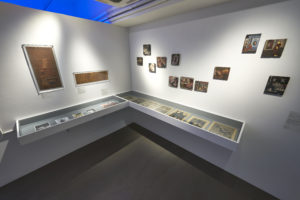 The exhibition also had works of Poklong Anading, Liliana Angulo, Xyza Cruz Bacani, Jean-François Boclé, Cheng Yee Man (Gum), Imelda Cajipe Endaya, Köken Ergun, Harun Farocki, Larry Feign, Hit Man Gurung, Fan Ho, Alfredo Jaar, Jao Chia-En, Eisa Jocson, Abdoulaye Konaté, Sakarin Krue-On, KUNCI Cultural Studies Center, Joyce Lung Yuet Ching, I GAK Murniasih, Daniela Ortiz, Beatrix Pang, Miljohn Ruperto, Santiago Sierra, Sun Yuan & Peng Yu, Melati Suryodarmo, Brian Gothong Tan, Maria Taniguchi, Ryan Villamael, and Elvis Yip Kin Bon.
The exhibition also had works of Poklong Anading, Liliana Angulo, Xyza Cruz Bacani, Jean-François Boclé, Cheng Yee Man (Gum), Imelda Cajipe Endaya, Köken Ergun, Harun Farocki, Larry Feign, Hit Man Gurung, Fan Ho, Alfredo Jaar, Jao Chia-En, Eisa Jocson, Abdoulaye Konaté, Sakarin Krue-On, KUNCI Cultural Studies Center, Joyce Lung Yuet Ching, I GAK Murniasih, Daniela Ortiz, Beatrix Pang, Miljohn Ruperto, Santiago Sierra, Sun Yuan & Peng Yu, Melati Suryodarmo, Brian Gothong Tan, Maria Taniguchi, Ryan Villamael, and Elvis Yip Kin Bon.
More information about the exhibition can be seen at the Para Site Website.
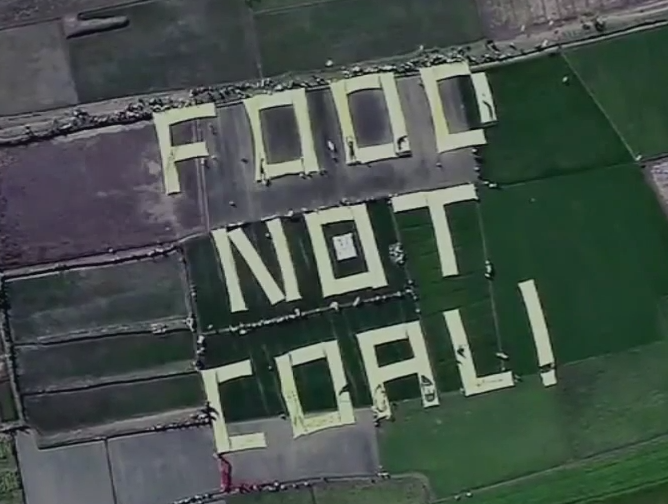
A 2000 mega watt capacity Coal Power Plant is planned for development in Batang, Java, Indonesia. Claimed to be the biggest in South Asia, this power plant will threaten productive rice fields and seas rich in fish and coral reefs that are the source of livelihoods for famers and fishermen in Batang. The 5 villages that will be affected are Karanggneng, Roban, Ujung Negoro, Wonokerso and Ponowareng. In September 2014 the people of these villages collaborated with Taring Padi, Greenpeace Indonesia and environmental youth group Batanglyon to campaign against the Batang Coal Power Plant. This is a film documenting that collaboration. It can also be seen on YouTube.
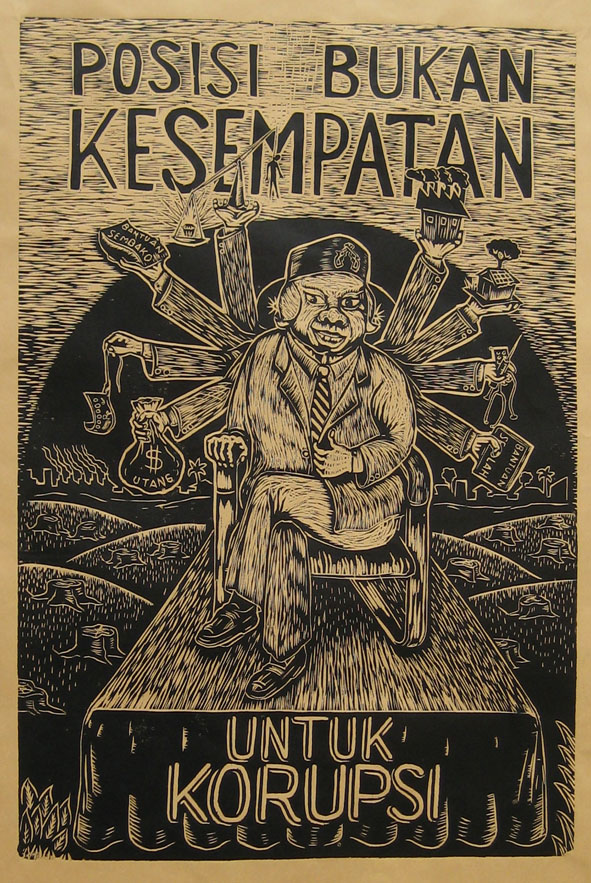
A short film about Taring Padi’s woodcut poster street art for the 2014 Indonesian national elections.
In 2009 Taring Padi produced a series of woodcut posters for the national Indonesian elections to promote debate, question and advocate on election related issues. These posters were distributed and pasted on walls in towns all over Indonesia through Taring Padi’s networks. This is the collection of these posters and documentation of the printing process and display.
A link to a blog about these posters can be found at Working Indonesia Blog.
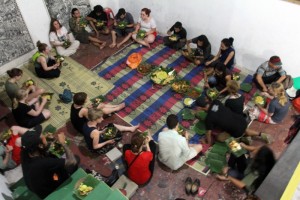
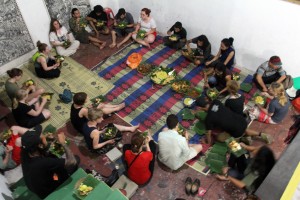
Students from the Stamp School of Art and Design at the University of Michigan head to Yogyakarta, Indonesia, to work with traditional and contemporary Javanese artists, including Taring Padi. The trip is led by Stamps School lecturers Charlie Michaels and Emilia Javanica-White.
Taring Padi is excited about this collaboration. Stay tuned for updates. You can also keep up to date with the Stamping Yogyakarta blog .

Taring Padi from 31century on Vimeo.
Taring Padi members explain about their art and collective while at Under, After, and In Between in Thailand.
